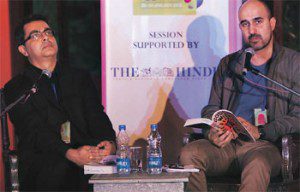Nile News employees stage sit-in protesting censorship
Egyptian state TV— for decades the mouthpiece of the authoritarian regime — is an ugly towering block of concrete and steel overlooking the River Nile at Maspero in downtown Cairo. In the post-revolutionary era, it is a heavily fortified fortress surrounded by barbed wire and stone barricades. Snipers can be spotted on the rooftop and terraces, and uniformed soldiers with machine guns stand guard outside the main entrances and exits. Corrugated iron gates have replaced the once-glass façade adding gloom to an already tense and inhospitable atmosphere inside the building which houses some 45,000 employees.
Upstairs on the fifth floor, a storm is brewing. Outside the main news studio, scores of employees of the main Arabic Nile News Channel are staging a sit-in, which they vow will continue until their demands are met. The demands include an immediate end to censorship and a set of reforms, which they say, are long overdue.
“Etman! Lift your hands off the media!” chant the angry protesters. Their message is addressed to Ismail Etman, the senior military general who currently heads the Armed Forces Morale Affairs Department.
‘‘We are also telling the station managers to keep their hands off. We are tired of censorship and interference in our editorial work,” complains Aly El Attar, a director at the channel.
The protest was triggered by the banning of a documentary on the 25 January revolution, produced by fellow director Aly El Geheny. Titled Tahrir Square, the documentary includes footage of the brutal treatment of peaceful protesters by security forces against during the mass uprising early last year. The decision by the Head of the News Sector not to broadcast the film enraged staff at the channel prompting them to take action. They vowed to show the film “with or without his consent.”
“We had a revolution a year ago but nothing has changed,” laments newscaster Iman Mansour. “We still work in a stifling and restrictive atmosphere. We are still waiting for the restructuring of editorial policies and the purging of state TV. ”
She insists that the red lines remain in place: the ruling military council having now replaced Hosni Mubarak as the new line that cannot be crossed.
“If a guest starts criticising the Supreme Council of the Armed Forces (SCAF), the atmosphere in the studio becomes tense and I’m instructed by the show producers to cut the program short,” Mansour says.
“On the other hand, if the guest is pro-SCAF, he or she is allowed to ramble on for as long as they like.”
But this maybe about to change.
Mansour affirms that in the past many of her co-workers practiced self- censorship because they were afraid of losing their jobs or worse still, of facing an investigation by a military court. These fears have been reinforced by recent media reports of fellow journalists and bloggers being summoned for interrogation by the Military Prosecutor — a trend, which according to the protesting journalists has become “all too common” in the post-revolutionary era.
Mahmoud El Azaly, a news editor at the channel complains that the station management had recently handed them an updated list of the guests they were permitted to host on their live shows. “This is unacceptable. In a free media, all voices are heard. No one is excluded,” he argues affirming that the channel has also extended its boycott of outspoken critics of the military rulers such as former Presidential-hopeful Mohamed El Baradei and author Alaa El Aswany.
Just days before Egypt’s Second Revolution, a protest planned by activists demanding an end to military rule, the Nile News journalists say they are adamant about covering events as they unfold. “Last year, we were confined to our studios and were not authorised to report from Tahrir. Now we are being told to cover the pro-military rally in Abbassiya instead. But we are not going to repeat the mistakes of the past. Our cameras will be in Tahrir too. We share the aspirations of the pro democracy activists,” El Attar asserts.
While a number of talk show hosts working for independent channels have taken a stand in recent months threatening to quit if their shows were censored, state television’s critics allege it is still biased in favour of the authorities. The journalists’ chants of “Down with military rule!” and “Thowar! Ahrar! We are free revolutionaries and we shall continue our revolution!” outside the Maspero office of the new Minister of Information mark a turning point and perhaps, a break from a repressive past.

